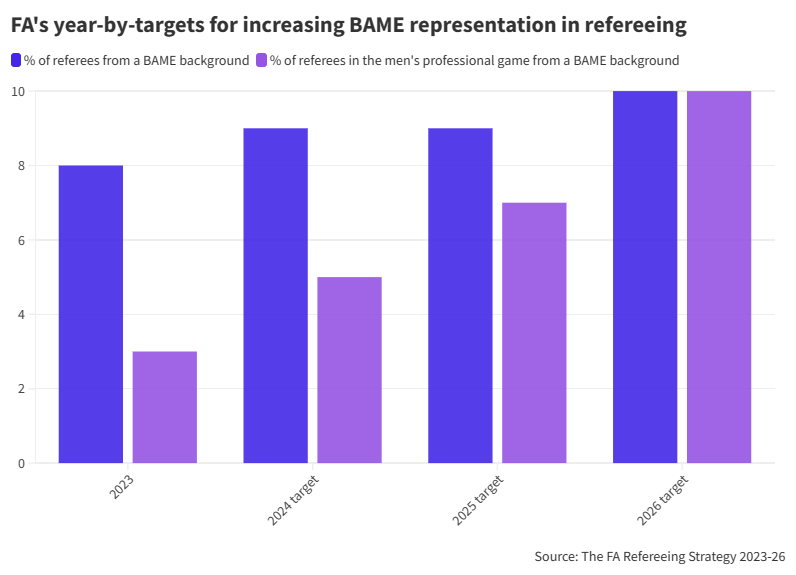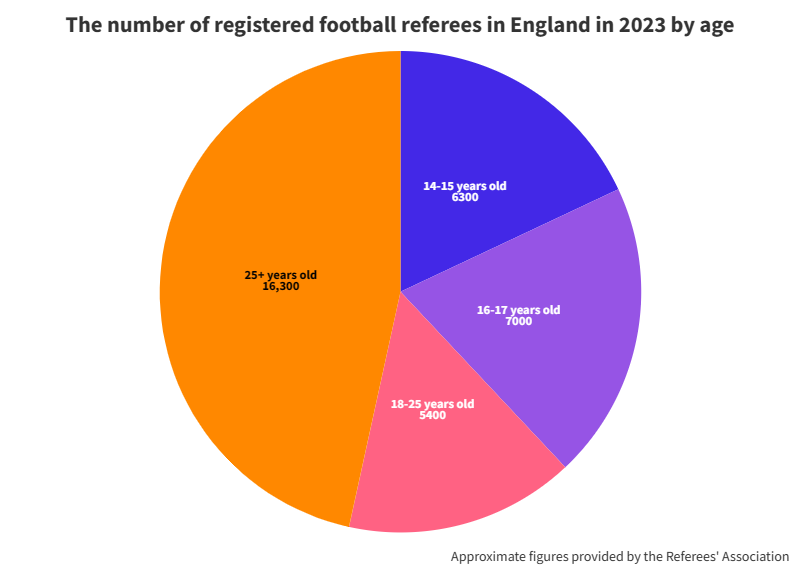Calls for more inclusivity in football refereeing to improve BAME representation
Joe Green investigates how exposure to abuse and financial barriers have impacted officials and the FA's commitment to diversifying refereeing.

On 9 March, Sunny Singh Gill became the first British South Asian to referee a top-flight match, while Sam Allison became the first Black British referee in the Premier League in 15 years in December.
While this is a positive sign for the future, an historic absence of diversity is indicative of referees from Black, Asian and minority ethnic (BAME) backgrounds being under-represented throughout the football pyramid.
Football officiating in England has consistently been dominated by white referees, an imbalance seen most visibly on the sport’s biggest stage, the Premier League.
Referees from all backgrounds are also confronted with the obstacles of the costs of training and being on the receiving end of abusive behaviour on matchdays.
Steve Oakey, the Chair of the Referees' Association (RA), explains the challenges facing referees looking to make a career for themselves at grassroots level.
He says: “There is much less support available for referees now than twenty years ago. The RA used to handle all the training for all the referees, but then the FA decided to take control of all recruitment and handed it out to the County FAs, who are limited companies.”
All referees can sign up to join the RA, a de facto trade union that can provide legal representation, financial aid and general support and mentoring to officials.
However, under the FA’s control the price of the 11-hour basic training course has gone from being free to a one-time payment of £130 per person.
Mr Oakey says: “Money being made from these courses is being diverted away from funding refereeing which means there is less support for referees, so you’re creating a self-fulfilling prophecy that there will be a need to invest more to recruit more.”
Significantly, this financial hurdle creates another barrier for aspiring referees from a BAME background in an already under-represented profession:


The FA launched a three-year strategy for grassroots refereeing in 2023 titled ‘To Grow, Guide and Govern’, which outlined the goal to make refereeing more inclusive by increasing the number of referees from historically under-represented groups by 50%, with only 1800 referees being Black or Asian as of August 2023.
There will be an increase in the number of courses delivered and the number of bursaries allocated with the aim of remedying a relative lack of participation that the FA says is caused by a lack of “role models, connections and awareness” as well as the deterrent of upfront costs.
Bav Gangajalia is a referee from a BAME background who has been officiating for three years and is currently a Level 5 senior referee.
Mr Gangajalia, 42, said: “Out of all the refs I’ve seen in my time in refereeing I have only seen one other person promoted from a BAME background. The FA can still do more and give further support and promotion to BAME refs.
“When I first took on the role and there were decisions I didn't see or make correctly, the players totally went against me. I was also told when I started that I would not make it to a higher level because of my age.”
According to the RA, there were 35,000 referees across all levels in 2023, an increase of 3000 from the previous year. However, the age of these referees is highly concentrated in the younger demographic, with almost 19,000 referees being under the age of 25, and 13,000 of them being under 18.
Of this group, roughly 50% fall away from the profession before turning 25, meaning there is a constant cycle of younger, newer referees.
Mr Oakey says this is partly due to the popularity of the training course among young people simply looking to complete qualifications such as the Duke of Edinburgh Award, but also as a result of the attritional nature of the job that exposes referees to abuse from players.
There were 1451 allegations of serious offences towards match officials made to the FA throughout grassroots football last season, an increase of 1% from the previous year.
Mr Oakey says: “The balance has started to change but we still get regular problems [regarding abuse]. Over the past month I’ve had two instances of serious assault on referees who are part of the RA, with police involved in both incidents.
“These situations are not helped by the wider perceptions of referees created by TV pundits saying they ‘expect better’ from players but then saying they are ‘incensed’ with a refereeing decision, which creates a very different type of mental picture.”
The FA are seeking to eradicate the manifestation of this perception at grassroots level by trialling bodycams for referees and appointing a Referee Experience Officer to support and engage with officials more proactively.
Peter Elsworth, the FA’s Head of Refereeing, said at the time of the plan’s launch: “This strategy looks to normalise and humanise refereeing. We need to bridge the gap between the current perception of referees and the real people who perform this role week in, week out.”
There is also support provided by charities such as Kick It Out and Mind, as well as BAMREF, an organisation that specifically supports BAME referees who have experienced racism and exclusion.
The RA work in close collaboration with several of these groups, with Mr Oakey saying: “We have an interest in promoting diversity within refereeing and being as inclusive as possible.
“Everything we try and do is built on the foundation of trying to be an open organisation that anyone can join if they’re a referee.”

